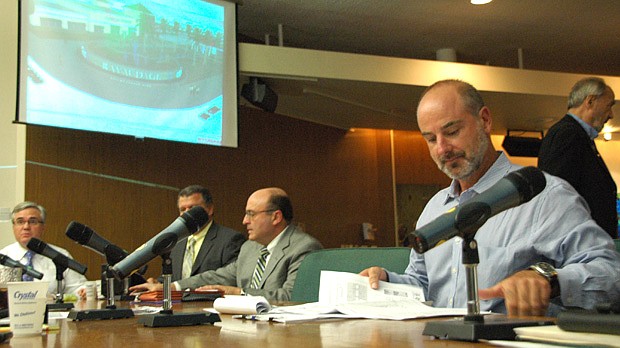- April 22, 2024
-
-
Loading

Loading

There is one thing Developer Dan Bellows new plan for the trading of impact fees has that his first one didn’t, Maitland City Attorney Cliff Shepard said: this one is legal.
Legal, but, after an initial reading on Dec. 12, seemingly unpopular with Council members.
When Bellows came up empty-handed following a challenge by Council to find legal counsel willing to back his idea of commoditizing impact fees for capital, his representative presented the city with a new approach before its last Council meeting Dec. 12.
The new idea proposes a three-day moratorium be placed on city Parks and Recreation impact fees, in which Atlantic Housing Partners — Bellows’ original target to sell his fees to — will apply for its building permits and be exempt from paying its $200,043 owed in Parks and Recreation fees. He will then enact his deal with Atlantic Housing separately, with a goal of raising capital to bolster development at his Gem Lake and Ravaudage sites.
The risk of that, Shepard said, is that the city won’t know what other developments might be coming through during that time, and how much money in Parks and Recreation fees the city could lose.
“But it has the thing that the other one didn’t: it’s legal,” he said.
Bellows was absent from the meeting, and the item was tabled pending further discussion, but comments from Council and the public were apprehensive.
Councilwomen Bev Reponen and Linda Frosch both issued concern over the money a moratorium like the one proposed would cost Parks and Recreation. Reponen said when she pulled the figures of how much the Parks and Recreation impact fees had brought in since they were established by an ordinance in 2009, she was surprised to find a grand total of zero. No developments had yet been required to pay the fees, she said. The money gathered from the fees is to be allocated to city park improvement plans.
“I like the idea of incentivizing businesses to do things, but I don’t like the idea that we have people coming in and don’t have any money to do things for the parks,” Reponen said. “…We’re writing one ordinance against another ordinance we already passed.”
Pamela Rue, a volunteer on the city’s Parks and Recreation Advisory Board, said taking away the opportunity for the little funding the Board would get toward improvements would be a disservice to the city and its residents.
“Everything is falling apart (in our parks), and if we want people to come to our city we have to take care of our city,” Rue said. “…We need to do what we can to fuel that fund.”
Resident Dale MacDonald offered a similar sentiment, saying the risk wasn’t worth the payoff when Bellows is already said to have invested $21 million into his Maitland developments and is bound to do something with it regardless.
“I’m not sure we have to roll over like a puppy to get our belly rubbed to get him to develop it,” he said.
With the item tabled, Maitland Mayor Howard Schieferdecker said the proposal will either come before the Council for vote in an upcoming meeting, or be dismissed altogether, ending Bellows 11-month hunt for impact fee deal options.
“From my point of view, I’m not sure at this point if it’s a good idea,” Schieferdecker said. “… And it didn’t seem very promising at the last meeting, that’s for sure.”